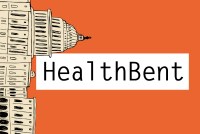What the Health? From KFF Health News: Part I: The State of the Abortion Debate 50 Years After ‘Roe’
In Part I of this special two-part episode, Alice Miranda Ollstein of Politico, Sandhya Raman of CQ Roll Call, and Sarah Varney of KHN join KHN chief Washington correspondent Julie Rovner to discuss how the abortion debate has evolved since the Supreme Court overturned the nationwide right to abortion in 2022, and what might be the flashpoints for 2023. Also in this episode, Rovner interviews Elizabeth Nash of the Guttmacher Institute, about changing reproductive policies in the states.
As States Seek to Limit Abortions, Montana Wants to Redefine What Is Medically Necessary
Montana officials are looking to tighten rules around medically necessary abortions for those who use Medicaid as their health insurance. Reproductive health advocates and Democratic lawmakers have said the move is part of a broader agenda to whittle away access to the procedure.
Watch: Fifty Years after ‘Roe,’ Abortion Rights Battle Shifts to the States
On the 50th anniversary of Roe v. Wade, we asked people across the U.S. what the abrupt upending of abortion rights has meant to them, and we lay out the stakes in the battles ahead.
Abortion Debate Ramps Up in States as Congress Deadlocks
Abortion is a top issue for state lawmakers meeting for their first full sessions since Roe v. Wade was overturned.
Watch: Anti-Abortion Activists Rally in DC in a Watershed Moment for Their Movement
Friday’s annual March for Life rally in Washington, D.C., held for the first time since Roe v. Wade was overturned, signals a new chapter in the anti-abortion movement.
Ask Voters Directly, and Abortion Rights Wins Most Ballot Fights
Anti-abortion candidates have fared well in recent elections. But decades of ballot initiatives — including a half-dozen measures considered after the Supreme Court overturned Roe v. Wade last June — show that when voters are asked directly, they usually side with preserving abortion rights.
What the Health? From KFF Health News: GOP House Opens With Abortion Agenda
Leaders of the new Republican-led U.S. House kicked off their legislative agenda with two bills supported by anti-abortion groups. While neither is likely to become law, the move demonstrates how abortion will continue to be an issue in Washington. Meanwhile, as open enrollment for the Affordable Care Act nears its end in most states, the number of Americans covered by the plans hits a new high. Margot Sanger-Katz of The New York Times, Alice Miranda Ollstein of Politico, and Sarah Karlin-Smith of the Pink Sheet join KHN’s Julie Rovner to discuss these topics and more. Plus, for extra credit, the panelists recommend their favorite health policy stories of the week they think you should read, too.
Bleeding and in Pain, a Pregnant Woman in Louisiana Couldn’t Get Answers
How one Louisiana woman experiencing a miscarriage sought care amid a climate of fear and confusion among doctors fueled by that state’s restrictive abortion law.
Despite Doctors’ Concerns, University of California Renews Ties With Religious Affiliates
The public university’s health system is renewing contracts with outside hospitals and clinics even as some doctors and faculty say clearer language is needed to protect physicians performing abortions and gender-affirming treatments.
Medicaid and Abortion Top Health Agenda for Montana Lawmakers
State lawmakers say their health care goals for the new legislative session are to lower costs and improve access to care. They’ll have to grapple with a full slate of other issues, as well.
What the Health? From KFF Health News: Year-End Bill Holds Big Health Changes
The year-end spending bill passed by Congress in late December contains a wide array of health-related provisions, including a structure for states to begin to disenroll people on Medicaid whose coverage has been maintained through the pandemic. Meanwhile, the Biden administration is taking steps to make the abortion pill more widely available. Joanne Kenen of the Johns Hopkins Bloomberg School of Public Health and Politico, Rachel Cohrs of Stat, and Rachel Roubein of The Washington Post join KHN’s chief Washington correspondent Julie Rovner to discuss these topics and more. Also this week, Rovner interviews Mark Kreidler, who reported and wrote the latest KHN-NPR “Bill of the Month” feature about a billing mix-up that took about a year to sort out.
In North Carolina, More People Are Training to Support Patients Through an Abortion
In the months since Roe v. Wade was overturned, training groups in North Carolina have seen an uptick in interest from people wanting to become abortion doulas.
KHN’s ‘What the Health?’: Health Spending? Only Congress Knows
Top negotiators in Congress have agreed to a framework for government spending into next year, but there are details to iron out before a vote — such as the scheduled Medicare payment cuts that have providers worried. Also, the Biden administration reopens its program allowing Americans to request free covid-19 home tests, as hopes for pandemic preparedness measures from Congress dim. Rachel Cohrs of Stat, Alice Miranda Ollstein of Politico, and Rebecca Adams of KHN join KHN’s Mary Agnes Carey to discuss these topics and more. Plus, for extra credit, the panelists recommend their favorite health policy stories of the week they think you should read, too.
KHN’s ‘What the Health?’: Congress Races the Clock
Sen. Raphael Warnock’s re-election in Georgia will give Democrats a clear-cut Senate majority for the first time in nearly a decade. Meanwhile, the current Congress has only days left to tackle major unfinished business on the health agenda, including fending off scheduled pay cuts for doctors and other health providers in the Medicare program. Joanne Kenen of the Johns Hopkins Bloomberg School of Public Health and Politico, Anna Edney of Bloomberg News, and Sandhya Raman of CQ Roll Call join KHN’s Julie Rovner to discuss these topics and more. Plus, for extra credit, the panelists recommend their favorite health policy stories of the week they think you should read, too.
KHN’s ‘What the Health?’: Medicaid Machinations
The lame-duck Congress has returned to Washington with a long health care to-do list and only a little time. Meanwhile, some of the states that have not yet expanded Medicaid eligibility under the Affordable Care Act are rethinking those decisions. Alice Miranda Ollstein of Politico, Rachel Cohrs of Stat, and Sarah Karlin-Smith of the Pink Sheet join KHN’s Julie Rovner to discuss these topics and more. Also this week, Rovner interviews KHN’s Fred Clasen-Kelly, who reported and wrote the latest KHN-NPR “Bill of the Month” feature, about a mysterious mishap during minor surgery.
‘An Arm and a Leg’: When Insurance Won’t Pay, Abortion Assistance Funds Step In
Privacy concerns and coverage limits have long made insurance an unreliable option for abortion access. For decades, abortion funds have been stepping in to help people pay for what they see as essential health care.
Patient Mistrust and Poor Access Hamper Federal Efforts to Overhaul Family Planning
For decades, many women of color, particularly those with low incomes, had little control over their family planning care. Now, a White House effort aims to give patients more choices as abortion care evaporates, but patients remain wary of providers.
After Election Win, California’s AG Turns to Investigating Hospital Algorithms for Racial Bias
Attorney General Rob Bonta handily won election on a progressive, social justice platform. He’s already begun with an inquiry into hospital software programs that might bake in racial discrimination.
KHN’s ‘What the Health?’: The Changing of the Guard
Democrats retained control of the U.S. Senate in the midterm elections, while Republicans won a majority in the House, giving them the ability to block items on President Joe Biden’s agenda. Meanwhile, the lame-duck, Democratic-led Congress won’t have the votes to pass abortion rights legislation, although they may try to undo some long-standing anti-abortion policies in federal spending bills. Joanne Kenen of the Johns Hopkins Bloomberg School of Public Health and Politico, Victoria Knight of Axios, and Alice Miranda Ollstein of Politico, join KHN’s Julie Rovner to discuss these topics and more.
KHN’s ‘What the Health?’: The Midterm Shake-Up
Election night went better than expected for Democrats. Although they could still lose control of one or both houses of Congress, the predicted “red wave” for Republicans failed to materialize. Meanwhile, voters in both red and blue states approved ballot measures to protect abortion rights. Alice Miranda Ollstein of Politico, Rachel Cohrs of Stat, and Sarah Karlin-Smith of the Pink Sheet join KHN’s Julie Rovner to discuss these topics and more. Also this week, Rovner interviews Carolee Lee, the former jewelry magnate, about her efforts to boost gender equity in medical research.



















